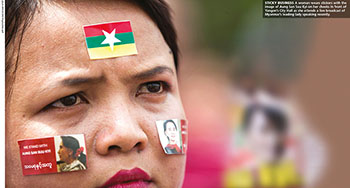MYANMAR CRISIS
THE LADY: UNDER THE SHADOW?
Amantha Perera critiques a onetime advocate for democracy and her failure to walk the talk

In 2014, Malaysian actress Michelle Yeoh who played Aung San Suu Kyi in the 2011 movie The Lady, gushingly introduced the icon to a packed auditorium in downtown Yangon. At the time, Suu Kyi was preparing for a historic election that would come by less than a year later.
To the audience comprising diplomats, visitors, NGO hacks and journalists like myself, she was almost a mythical figure. She’d spent the better part of two decades since 1988 taking on one of the most brutal military dictatorships in Myanmar.
To say that the audience was eating out of her hand would be an understatement.
After Yeoh’s introduction, the audience was told not to move around and not rush to the podium. They were also told that Suu Kyi would not have much time but will take a few questions after her speech. The Lady understood her charisma and though she was aloof, she wasn’t obnoxious.
This was also the time that the discontent in the northern Rakhine region was simmering due to tensions between the Muslim Rohingya and mainly Buddhist Burmese.
During question time, she shot down one query about the Rohingya by a visiting journalist from an Asian country. Suu Kyi had earlier said that to deal with Myanmar’s multiple woes, the rule of law had to be established first.
After she declined to respond to the Rohingya question, Suu Kyi insisted that the mic be passed on to a reporter from an international network. The open palm gesture that accompanied the issue of the mic struck me like a thunderbolt.
I had seen a similar gesture in Colombo less than five years back. That was when the former Army Commander Sarath Fonseka addressed the media and announced that he was to contest the presidential election.
Both Suu Kyi and Fonseka used the open palm gesture to great effect.
In the years since my first encounter with Suu Kyi, she has stood for election and gained the position of leader of Myanmar – something she should’ve been bestowed with in 1988.
All this despite the constitutional provision introduced specifically for her. It precludes anyone who has a spouse, a child, or a son or daughter-in-law and who isn’t a citizen of Myanmar from holding the office of president. She is now officially referred to as the State Counsellor but is in fact the de facto head of state.
The desperate situation in Rakhine – where the Rohingya Muslims find themselves in the majority in Buddhist majority Myanmar – has been festering for some time. Since 2015, Suu Kyi has faced criticism that she hasn’t been vocal enough for a Nobel Laureate and one who fought so hard for fundamental rights.
When her legal adviser and Muslim lawyer Ko Ni was assassinated as he stepped into a taxi outside Yangon International Airport on 29 January, Suu Kyi’s actions (or more specifically, the lack of action) have raised many eyebrows. The Lady didn’t attend his funeral and nor did she meet his bereaved family soon after his murder.
Then on 25 August, things took a bad turn: that was when around 20 police posts in Rakhine came under attack by suspected Rohingya militants. The attacks killed over 70 including a dozen or so from state forces.
The reprisals were brutal.
Less than a month later, nearly 500,000 Rohingya had been forced to flee across the border to Bangladesh when their villages were torched by Myanmar’s security forces and mobs. The UN has called the actions of Myanmar’s government an act of ‘ethnic cleansing.’
The blame has been placed squarely on Suu Kyi, once the darling of the Western press and the liberal elite. South Africa’s Bishop Desmond Tutu has written to Suu Kyi asking her to act on the Rohingya’s plight while others have called for rescinding the Nobel Peace Prize awarded to her in 1991. When she finally spoke on 19 September in addressing diplomats, the speech was classical Suu Kyi – eloquent but littered with rhetoric that failed to specify any solutions.
Friends and colleagues in Myanmar, some of whom took deadly risks for the sake of Suu Kyi and her fight for democracy, tell me that the international press doesn’t understand the complex situation that The Lady has inherited.
Despite her party the National League for Democracy (NLD) winning the election and securing power, Myanmar’s Army still controls three key ministries – viz. defence, home affairs and border affairs. And the commander-in-chief of the Myanmar Armed Forces Min Aung Hlaing has more power over what the military does than Suu Kyi.
Aung San Suu Kyi is no longer an advocate for democracy – she is now a politician who has to be pragmatic since her every move is scrutinised. She won the mantle of leadership that she clamoured for – and today, the nation’s problems (past, present and future) are hers and hers alone.
There is also overwhelming support for the Army’s actions in Rakhine among the majority Buddhist community who view the Rohingya – who were made stateless by the military government in 1982 – as interlopers.
The Buddhist clergy was at the vanguard of the democracy movement and Suu Kyi knows how much power it wields. Observers say that the rising anti-Muslim sentiment in the country may have been one reason for the NLD’s failure to field any Muslim candidates at the last election.
Suu Kyi is also mindful that while the military may be in the background, it is most certainly not defanged and will strike at the slightest hint of public anger against her.






Leave a comment